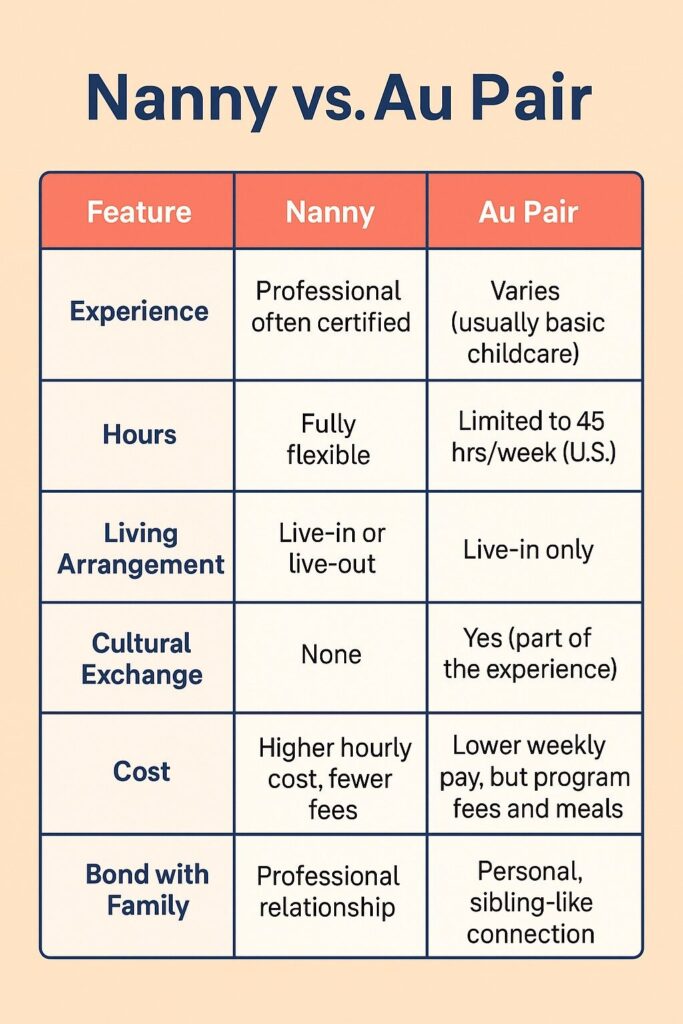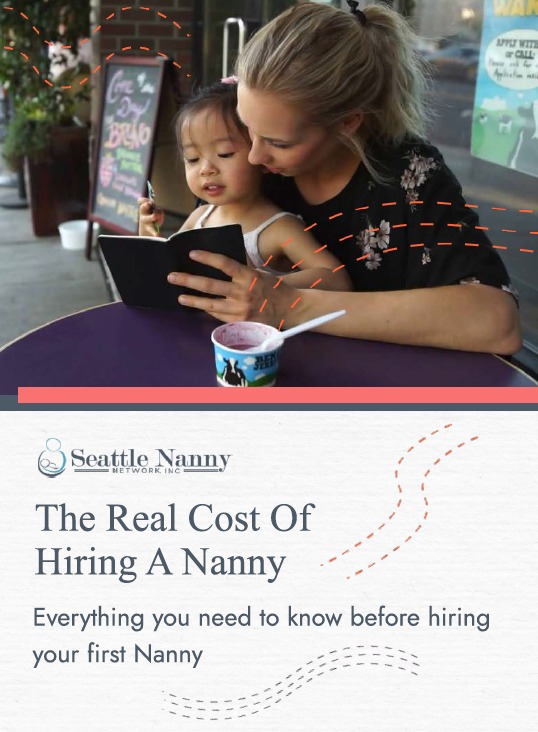If you’re exploring childcare options, you’ve probably wondered: What’s the difference between a nanny and an au pair? On the surface, they both provide care for your children at home, but in reality, they offer very different experiences for both children and parents.
Many families find themselves considering these options, especially when juggling work schedules, budgets, and the desire for a safe, enriching environment for their children. So, let’s break down the key differences in qualifications, living arrangements, schedules, and costs with real-life insight from families and former au pairs.
Are Nannies and Au Pairs the Same?
Nannies and au pairs are definitely not the same, and people with firsthand experience will tell you as much.
“In my experience, no. I was like an older sister to my host kids and a friend to the parents. You’re not a nanny at all. I was treated like a family member. Their problems were my problems, their fun was my fun, their celebrations were my celebrations. It was a wonderful experience.” – Former Au Pair
“No. They’re more like big sisters. None of mine have professional childcare experience. They’re here to care for children while learning English.” – Host Family
These quotes highlight something important: an au pair is part of your home life in a personal, cultural way while a nanny is more of a trained, hired professional.
What Is a Nanny?
A nanny is a professional caregiver who is paid to look after your child in your home. Many nannies have formal experience, certifications (like CPR or early childhood education), and offer reliable, structured care that fits your schedule.
Nannies can be live-in or live-out, and they may also help with meals, light housekeeping, school pickup/drop-off, or even tutoring depending on their background.
What Is an Au Pair?
An au pair is a young person from abroad (usually 18–26 years old) who joins your family through a cultural exchange program. In return for room, board, and a small stipend, the au pair provides up to 45 hours of childcare per week, often including help with light household duties like children’s laundry or meal preparation.
The au pair lives in your home and becomes immersed in your family’s daily life with the goal of becoming fluent in English and experiencing new culture.
Many families love the bond that forms:
“They felt like a part of our family, not like someone we hired. We shared holidays, inside jokes, and tears at the airport when their year was up.”
Nanny vs. Au Pair: A Side-by-Side Comparison
1. Qualifications and Experience
● Nannies often have years of experience and professional training.
● Au pairs may have basic babysitting experience but usually aren’t certified caregivers.
If your family is looking for structured early education or special needs care, a nanny may be more qualified. If your family wants someone who feels like an older sibling and brings new culture into your home, an au pair could be the perfect fit.
2. Living Arrangements
● Nannies can live in or out of your home, depending on your needs.
● Au pairs must live with you and have a private room and meals.
Hosting someone in your home means sharing your space and routine, which can be wonderful (or overwhelming) depending on your lifestyle.
3. Schedules and Flexibility
● Nannies can work custom hours, including nights or weekends.
● Au pairs have a limit: no more than 10 hours a day and 45 hours per week (in the United States).
If you have irregular or long work hours, a nanny may offer more flexibility. If you want someone who’s woven into your daily life, an au pair’s set schedule might be just right.
4. Cost and Compensation
● Nannies earn an hourly wage or salary—anywhere from $18–$35/hour depending on experience and location.
● Au pairs receive a weekly stipend (currently $195.75/week in the United States), but families also pay agency fees (often $8,000–$10,000 per year), plus provide housing and meals.
While an au pair may look less expensive on paper, remember to factor in total program costs and the commitment of welcoming someone into your home.
Which One Is Right for Your Family?
Choosing between a nanny and an au pair comes down to your priorities:

Final Thoughts
The decision between a nanny and an au pair isn’t just about money or availability—it’s about what kind of relationship you want your caregiver to have with your family.
Whether you’re looking for professional childcare expertise or a meaningful cultural experience, both nannies and au pairs offer unique benefits. The best choice is the one that fits your family’s needs, energy, and lifestyle.
Popular Searches This Blog Answers:
● “Nanny vs au pair pros and cons”
● “How much does a nanny cost?”
● “Do au pairs live with you?”
● “Are au pairs safe?”
● “Is an au pair right for my family?”



